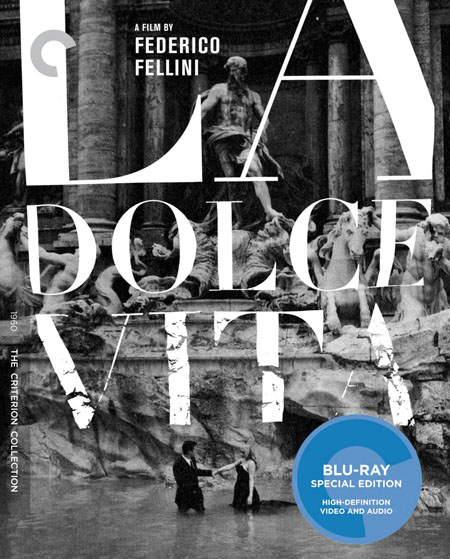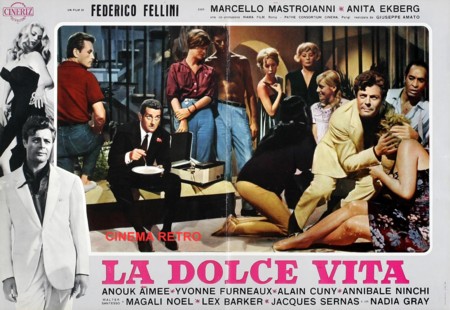
THE LIFE NOT SO
SWEET
By
Raymond Benson
The
title of Federico Fellini’s landmark, influential 1960 film La dolce vita (“The Sweet Lifeâ€) is
ironic. Marcello (exquisitely played by Marcello Mastroianni) is a Rome
journalist working in the tabloid trade, specializing in stories of the rich
and famous. While Marcello’s day-to-day existence might indeed at first seem
like the sweet life, he is, in fact, a lonely, unhappy soul. And that’s the
point of Fellini’s comedy-drama that still manages to enlighten audiences
today, fifty-four years later. Fellini seems to be saying that no matter how
hard you pursue “the sweet life,†you will still be left with yourself—and if
you don’t like yourself, then you’re in trouble.
La dolce vita was released just
as the French New Wave was making a splash, when America’s Production Code was
being chipped away at, and when Italy was making the painful transition from
the post-war doldrums to the hipster avant-garde 60s. Fellini’s movie signaled
his own creative evolution from his early Italian Neo-Realist beginnings to a
more surreal, playful, and stylized sensibility that would grow more outrageous
as the decade went on. La dolce vita is
mostly in the neo-realist vein of Nights
of Cabiria and La Strada, but
Fellini always adds an extra touch of whimsy and peculiarity to his pictures
that the hardcore neo-realists like De Sica or Rossellini didn’t do. And that’s
what made him Fellini.
The
nearly three-hour movie is a Homeric odyssey of sorts as Marcello spends seven
days and nights on assignment for his tabloid, chasing down famous actress
(Anita Ekberg in an iconic role as “herselfâ€), the purported sighting of the
Madonna, and other sensational stories—but mostly he’s chasing the nightlife,
love, attention, and intellectual intercourse with Rome’s elite. And women, of
course. Marcello is the ultimate playboy, a persona that would follow the actor
Mastroianni his entire life. Through the episodic film, Marcello encounters
sex, debauchery, pathos, and tragedy. But never happiness.

Fellini’s
film was controversial at the time for revealing the underbelly of Rome’s
“sweet life,†and mostly for offending the Catholic Church with the opening
scene of a helicopter flying a suspended statue of Christ over ancient ruins in
the city—perceived as parodying the “second coming.†But offending the Catholic
Church with film in the early 60s was a badge of honor—nearly every important
and innovative picture was guilty of it. The bravura opening sequence aside,
the picture was still deemed scandalous for exposing Rome’s hypocrisies and
decadence in a “docu-drama†that tackles sex, religion, and politics.
Even
within its realism, Fellini’s touches of extravagance are everywhere. Characters
become caricatures to be gawked at. The ever-present Fellini prostitutes are
simultaneously human and grotesque. The costumes (Oscar winner) themselves are
glorious and so utterly “modern.†The widescreen black and white cinematography
by Otello Martelli is gorgeous with striking contrasts, especially on
Criterion’s new 4K digital restoration by The Film Foundation. It looks even
better than the Fox/Lorber restored special edition that came out on DVD a few
years ago.
You
might want to hold on to that Fox/Lorber edition, though, for The Criterion
Collection’s version does not have the same extras—in fact, the earlier DVD
edition has the better crop of goodies. That said, Criterion brings us a number
of new extras that are well worth the purchase price of the Blu-ray. Among
these are a new interview with director Lina Wertmuller, who was assistant
director on the picture (whatever happened to her?); a new interview with
scholar David Forgacs about the period in Italian history when the film was
made; a vintage interview with Fellini from 1965; an audio interview with
Mastroianni from the early 60s; Felliniana,
a presentation of La dolce vita ephemera;
an exceptional visual essay by filmmaker :: kogonada which reveals the clues
that Fellini is moving away from neo-realism and into more fanciful territory;
and more. Gary Giddens provides the essay in the booklet.
La dolce vita is one of the
greats. If you don’t already own it, now’s the time to get it.
CLICK HERE TO ORDER DISCOUNTED FROM AMAZON